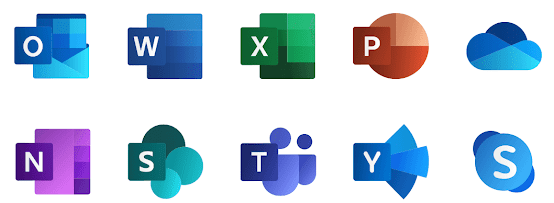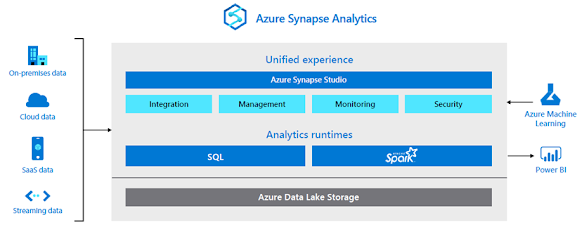All you need to know about Microsoft 365 formally known as Office 365
As
a product line, Microsoft Office dates back nearly three decades, with early
versions essentially combining Word, Excel, and PowerPoint into a discounted
bundle. Microsoft 365 (previously known as Office 365), which has been
available since 2011, differs from that old-fashioned bundle in two respects:
First, it's sold as a subscription (billed monthly or yearly), rather than as a
perpetual license with a fixed one-time payment. Second, it combines a suite of
online services, including business-class email, cloud file storage, and secure
communication tools along with the traditional desktop apps.
Because it's a subscription offering, those desktop programs are updated automatically when a new version is available. If your subscription is current, you get the latest versions, with security releases monthly and feature updates every six months, on the same calendar as Windows 10.
Microsoft 365 is available in Family and Personal editions (previously known as Office 365 Home and Personal, respectively) that are intended for use by families, students, and individuals for personal, non-commercial use.
In this guide, we cover the multitude of Microsoft 365 Business and Enterprise editions, which offer a more advanced feature set than the Family and Personal editions, with collaborative applications and management tools that are designed for meeting enterprise security and compliance challenges.
The exact mix of apps and services available with a Microsoft 365 subscription depends on which edition you've chosen.
Because it's a subscription offering, those desktop programs are updated automatically when a new version is available. If your subscription is current, you get the latest versions, with security releases monthly and feature updates every six months, on the same calendar as Windows 10.
Microsoft 365 is available in Family and Personal editions (previously known as Office 365 Home and Personal, respectively) that are intended for use by families, students, and individuals for personal, non-commercial use.
In this guide, we cover the multitude of Microsoft 365 Business and Enterprise editions, which offer a more advanced feature set than the Family and Personal editions, with collaborative applications and management tools that are designed for meeting enterprise security and compliance challenges.
The exact mix of apps and services available with a Microsoft 365 subscription depends on which edition you've chosen.
EXCHANGE
ONLINE
This business-class email offering gives every Microsoft 365 subscriber in your organization a mailbox with a maximum capacity of 50 GB or 100 GB, with the ability to access email through a web browser or using the Outlook app on Windows, on a Mac, or on mobile devices. Malware and spam filtering are built in, as are basic features like shared mailboxes and (for some Microsoft 365 subscriptions) advanced features like eDiscovery.
This business-class email offering gives every Microsoft 365 subscriber in your organization a mailbox with a maximum capacity of 50 GB or 100 GB, with the ability to access email through a web browser or using the Outlook app on Windows, on a Mac, or on mobile devices. Malware and spam filtering are built in, as are basic features like shared mailboxes and (for some Microsoft 365 subscriptions) advanced features like eDiscovery.
ONEDRIVE
FOR BUSINESS
Every Microsoft 365 business subscriber gets 1 TB of personal OneDrive for Business storage, with sync clients available for every desktop and mobile platform. The Windows 10 client uses the same sync client as the consumer OneDrive service, keeping data in a separate location. The Files on Demand feature allows users to view and manage cloud-based storage using File Explorer. Administrators of Enterprise plans can upgrade users to unlimited storage if a terabyte is not enough.
Every Microsoft 365 business subscriber gets 1 TB of personal OneDrive for Business storage, with sync clients available for every desktop and mobile platform. The Windows 10 client uses the same sync client as the consumer OneDrive service, keeping data in a separate location. The Files on Demand feature allows users to view and manage cloud-based storage using File Explorer. Administrators of Enterprise plans can upgrade users to unlimited storage if a terabyte is not enough.
SHAREPOINT
ONLINE
The SharePoint interface is now sleek where it was once clunky, allowing teams to share files and sync information in File Explorer using the same desktop client as in OneDrive for Business. Both SharePoint and Exchange Online include administrative controls to restrict users from sharing confidential information outside the organization.
The SharePoint interface is now sleek where it was once clunky, allowing teams to share files and sync information in File Explorer using the same desktop client as in OneDrive for Business. Both SharePoint and Exchange Online include administrative controls to restrict users from sharing confidential information outside the organization.
MICROSOFT
TEAMS
This collaborative platform replaces the older Skype for Business service, offering unified communications, HD video conferencing, and instant messaging for Microsoft 365 subscribers in an organization, along with a team-and-channel-based architecture that covers much of the same feature set as alternatives like Slack. The free version of Teams allows small businesses to use the service without having to pay any license fees. Usage of Microsoft Teams has expanded dramatically since early 2020, when pandemic-related shutdowns made it an ideal choice for remote-work scenarios. The developers behind Teams have been shipping new features monthly for desktop, mobile, and web-based apps.
This collaborative platform replaces the older Skype for Business service, offering unified communications, HD video conferencing, and instant messaging for Microsoft 365 subscribers in an organization, along with a team-and-channel-based architecture that covers much of the same feature set as alternatives like Slack. The free version of Teams allows small businesses to use the service without having to pay any license fees. Usage of Microsoft Teams has expanded dramatically since early 2020, when pandemic-related shutdowns made it an ideal choice for remote-work scenarios. The developers behind Teams have been shipping new features monthly for desktop, mobile, and web-based apps.
ADDITIONAL
SERVICES
Some Microsoft 365 plans include services targeted for specific audiences. The Microsoft 365 Business Standard and Business Premium plans, for example, include services for small and medium-sized businesses; these tools include Microsoft Bookings, which allows customers to schedule and manage appointments, and MileIQ, a mileage-tracking service. All Enterprise plans include the Yammer social networking service and a selection of business automation tools, including Microsoft Power Apps to build custom forms, Power Automate to streamline repetitive workflows, and Power BI Pro, an advanced business analytics tool.
Some Microsoft 365 plans include services targeted for specific audiences. The Microsoft 365 Business Standard and Business Premium plans, for example, include services for small and medium-sized businesses; these tools include Microsoft Bookings, which allows customers to schedule and manage appointments, and MileIQ, a mileage-tracking service. All Enterprise plans include the Yammer social networking service and a selection of business automation tools, including Microsoft Power Apps to build custom forms, Power Automate to streamline repetitive workflows, and Power BI Pro, an advanced business analytics tool.
Which desktop apps
are available in Microsoft 365?
Every Microsoft 365 plan that includes desktop apps offers the following Office applications for all supported versions of Windows and for MacOS: Outlook, Word, Excel, PowerPoint, and OneNote. On Windows PCs only, Access and Publisher are available. Microsoft recently announced plans to include a "lightweight" version of Visio with its business plans. These apps are updated automatically to the latest version, with monthly security updates and twice-annual feature updates.
Microsoft 365 subscriptions provide per-user licenses, which means that the apps can be installed and used on up to five phones, five tablets, and five PCs or Macs simultaneously. From their personal subscription portal, a user can sign in using their Microsoft 365 credentials and manage installs without having to enter product keys or worry about activation. By contrast, perpetual-license versions of Office are typically licensed for use on one device only and cannot be transferred.
Web-based versions of Word, Excel, and PowerPoint offer fairly robust tools that allow editing of files stored in OneDrive for Business. These tools work in any modern desktop browser without requiring additional software. Most business plans also offer Outlook on the web.
Every Microsoft 365 plan that includes desktop apps offers the following Office applications for all supported versions of Windows and for MacOS: Outlook, Word, Excel, PowerPoint, and OneNote. On Windows PCs only, Access and Publisher are available. Microsoft recently announced plans to include a "lightweight" version of Visio with its business plans. These apps are updated automatically to the latest version, with monthly security updates and twice-annual feature updates.
Microsoft 365 subscriptions provide per-user licenses, which means that the apps can be installed and used on up to five phones, five tablets, and five PCs or Macs simultaneously. From their personal subscription portal, a user can sign in using their Microsoft 365 credentials and manage installs without having to enter product keys or worry about activation. By contrast, perpetual-license versions of Office are typically licensed for use on one device only and cannot be transferred.
Web-based versions of Word, Excel, and PowerPoint offer fairly robust tools that allow editing of files stored in OneDrive for Business. These tools work in any modern desktop browser without requiring additional software. Most business plans also offer Outlook on the web.
When you sign in
with an active subscription on mobile devices (iOS and Android) , a new unified
Office app offers a single place to create, view, and edit Word, Excel, and
PowerPoint files. The Outlook app provides a unified view of business and
personal email and calendar accounts. Mobile apps are also available for
Microsoft 365 services, including OneDrive, Skype for Business, and Microsoft
Teams.
Prometix
as a Microsoft Gold certified partner and certified O365 consultants (Sydney,
Canberra, Melbourne & Perth), we have extensive experience in delivering Microsoft
365 based solutions. We have completed Microsoft 365 rollout for large to
medium organisations including state/federal governments & private sectors.
For more information, please contact us from enquiries@prometix.com.au



Comments
Post a Comment